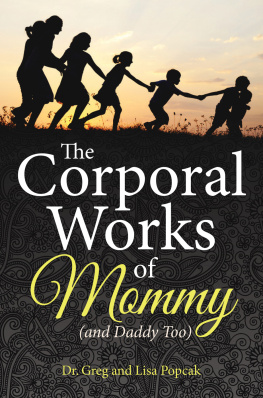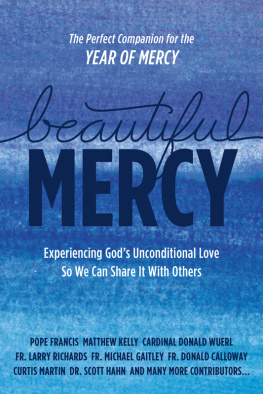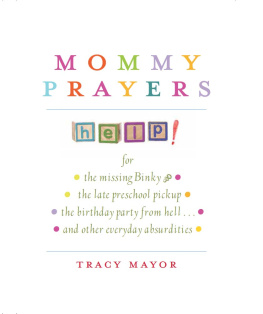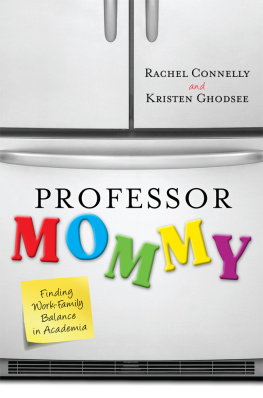
The
Corporal Works
of Mommy
(and Daddy Too!)
The
Corporal Works
of Mommy
(and Daddy Too!)
Dr. Greg and Lisa Popcak
Our Sunday Visitor
www.osv.com
Our Sunday Visitor Publishing Division
Our Sunday Visitor, Inc.
Huntington, Indiana 46750
Nihil Obstat
Msgr. Michael Heintz, Ph.D.
Censor Librorum
Imprimatur
 Kevin C. Rhoades
Kevin C. Rhoades
Bishop of Fort Wayne-South Bend
February 20, 2016
The Nihil Obstat and Imprimatur are official declarations that a book is free from doctrinal or moral error. It is not implied that those who have granted the Nihil Obstat and Imprimatur agree with the contents, opinions, or statements expressed.
Scripture texts in this work, except where noted, are taken from the New American Bible, revised edition 2010, 1991, 1986, 1970 Confraternity of Christian Doctrine, Washington, D.C., and are used by permission of the copyright owner. All rights reserved. No part of the New American Bible may be reproduced in any form without permission in writing from the copyright owner.
Scripture text noted as (NIV) taken from the Holy Bible, NEW INTERNATIONAL VERSION, NIV Copyright 1973, 1978, 1984, 2011 by Biblica, Inc. Used by permission. All rights reserved worldwide. NEW INTERNATIONAL VERSION and NIV are registered trademarks of Biblica, Inc. Use of either trademark for the offering of goods or services requires the prior written consent of Biblica US, Inc.
English translation of the Catechism of the Catholic Church for use in the United States of America copyright 1994, United States Catholic Conference, Inc. Libreria Editrice Vaticana. English translation of the Catechism of the Catholic Church: Modifications from the Editio Typica copyright 1997, United States Catholic Conference, Inc. Libreria Editrice Vaticana.
Every reasonable effort has been made to determine copyright holders of excerpted materials and to secure permissions as needed. If any copyrighted materials have been inadvertently used in this work without proper credit being given in one form or another, please notify Our Sunday Visitor in writing so that future printings of this work may be corrected accordingly.
Copyright 2016 by Dr. Gregory K. and Lisa Popcak. Published 2016.
21 20 19 18 17 161 2 3 4 5 6 7 8 9
All rights reserved. With the exception of short excerpts for critical reviews, no part of this work may be reproduced or transmitted in any form or by any means whatsoever without permission from the publisher. For more information, visit: www.osv.com/permissions
Our Sunday Visitor Publishing Division, Our Sunday Visitor, Inc., 200 Noll Plaza, Huntington, IN 46750; 1-800-348-2440
ISBN: 978-1-68192-033-7 (Inventory No. T1787)
eISBN: 978-1-68192-034-4
LCCN: 2016933961
Cover design: Amanda Falk
Cover art: Shutterstock
Interior design: Dianne Nelson
Printed in the United States of America
Table of Contents
Chapter One
Introduction
In the Sermon on the Mount, Jesus says, Blessed are the merciful, for they will be shown mercy (Mt 5:6). As Pope Francis has reminded us, mercy is a defining virtue of the Christian walk. What does it mean to be merciful? And what difference does it make in the life of your family?
If you consider both the corporal works of mercy for example, give food to the hungry, give drink to the thirsty, shelter the homeless, etc. and the spiritual works of mercy altogether, it becomes clear that being merciful means treating others in a manner that allows them to see their profound worth in Gods eyes. Is there a more important, or more opportune, place to practice this than in the heart of your familys home?
Each Person Is Sacred
The United States Conference of Catholic Bishops once asserted that each person must be respected with a reverence that is religious. When we deal with each other, we should do so with the sense of awe that arises in the presence of something holy and sacred. For that is what human beings are: we are created in the image of God (Economic Justice for All, 28).
When we show mercy to others especially by living out the various works of mercy we remind each other that no matter what we look like, no matter what our station in life, and no matter what we have done, we are sacred and precious in Gods sight.
Well Always Be Royals
A popular song by singer Lorde proclaims, Well never be royals. Christians know that nothing could be further from the truth! Each person is made in Gods image and likeness. Baptism enables us to be prophets, priests, and royals. As the Catechism of the Catholic Church puts it:
The People of God shares in the royal office of Christ. He exercises his kingship by drawing all men to himself through his death and Resurrection. Christ, King and Lord of the universe, made himself the servant of all, for he came not to be served but to serve, and to give his life as a ransom for many [Mt 20:28]. For the Christian, to reign is to serve him, particularly when serving the poor and the suffering, in whom the Church recognizes the image of her poor and suffering founder [Lumen Gentium 8; cf. 36]. The People of God fulfills its royal dignity by a life in keeping with its vocation to serve with Christ. (786)
But its important to remember why we attend to others physical needs. In his Theology of the Body, Pope St. John Paul II famously asserted that the body and it alone, is capable of making visible what is invisible: the spiritual and the divine (General Audience, February 20, 1980). In other words, when we practice the works of mercy, we arent just caring for each others bodies; we celebrate each others dignity as persons and assert that each of us is an heir to the kingdom of God destined, through Gods merciful grace, to reign with him forever.
We engage in works of mercy such as clothing the naked because every child of God deserves to be dressed in a manner that reveals his or her dignity as a son or daughter of the King of Kings! We feed the hungry because every person deserves to know he or she has a rightful place at the royal feast set at Gods table! We forgive willingly and bear wrongs patiently because we recognize the challenges involved in becoming saints, and we try to be generous about the struggle thats part of that process. And yet, when those we love forget who they really are, neglecting to strive for greatness and, instead, deciding to wallow in their brokenness, we admonish the sinner, not to condemn or judge but to invite them to remember that they were meant to be more, and to live more fully than they are.
Mercy: The Heart of the Home
Many families mistakenly think that the ways they care for one another at home somehow dont count and that the works of mercy are something missionaries practice when ministering to the poor in far-off lands. In truth, most peoples biggest opportunity to practice mercy and, in particular, the works of mercy is right at home! The Church has long taught that the family is a school of humanity: a place where children and adults together discover their value as persons by the way they love, respect, and care for one another. Its because of this critical role that family life is ground zero for learning to walk the way of mercy. Any authentic expressions of mercy we carry out in the world must be rooted in the lessons of mercy we learn in the home. Christian parents and children work to help each other discover their worth in Gods eyes in the little interactions they share throughout the day. The way we families eat, drink, dress, keep our homes, and all the rest are not merely ways we attend to our bodily needs; they are ways we proclaim to each other, You are a child of God!
Next page












 Kevin C. Rhoades
Kevin C. Rhoades